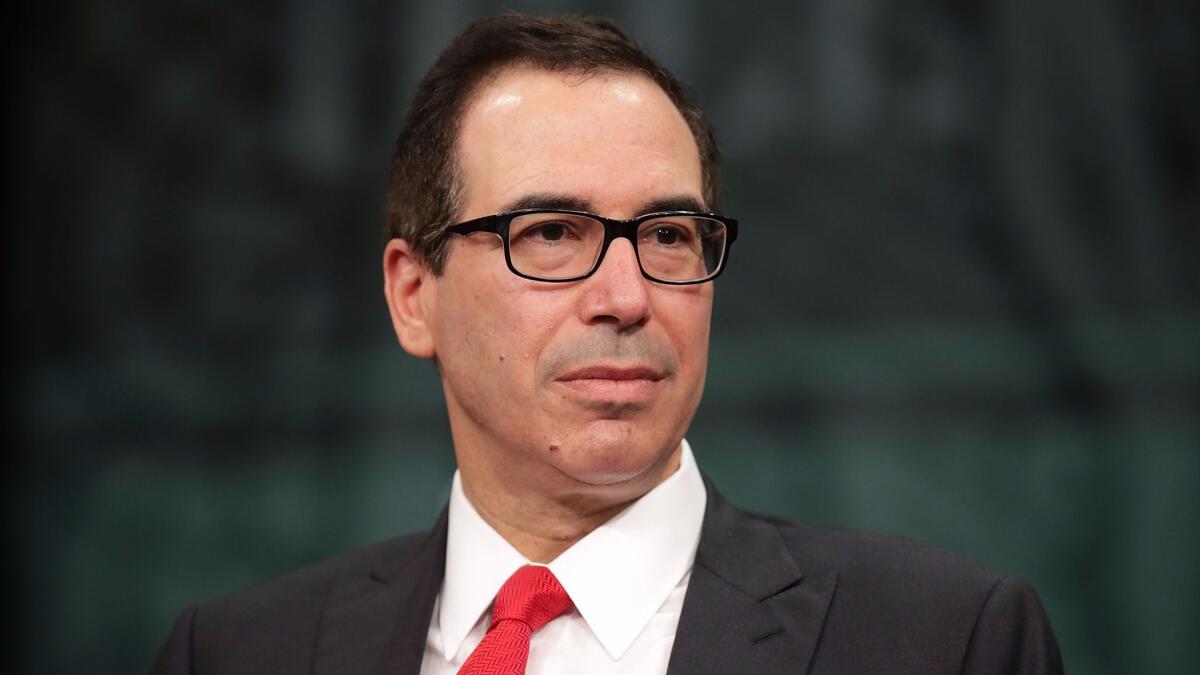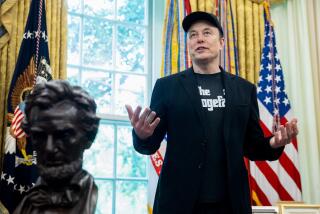Mnuchin defends proposal to eliminate tax deduction that benefits Californians — including himself

- Share via
Treasury Secretary Steven Mnuchin on Monday stumped for the Trump administration tax plan rolled out last week — noting that he is for it even though one reform would hit his own wallet.
Saying that a simpler tax code and lower taxes will promote robust economic growth, Mnuchin defended the proposal to eliminate many deductions, including the federal deduction for local and state taxes.
That itemized deduction is something that residents of high-income states such as California rely on to lower their federal tax rate. Californians deducted $101 billion in state income and other taxes in 2014, by far the most of any state, according to the nonpartisan Tax Foundation.
“We don’t think it’s the federal government’s job to be subsidizing states,” said Mnuchin, speaking at the Milken Institute Global Conference, a Beverly Hills confab that brings together politicians, philanthropists, researchers and investors.
“Some states have zero income taxes, some have high income taxes.... For people like me who live in California, you’re going to be stuck with higher taxes that you can’t deduct,” he said.
But for high-income earners like Mnuchin, the loss of the state income-tax deduction could be partially offset by lower overall tax rates. Mnuchin reported income of as much as $71 million over the last two years and has assets worth at least $166 million, according to financial disclosure forms filed last year.
The former Goldman Sachs banker and Hollywood film financier earned millions when he and other wealthy investors bought failed Pasadena mortgage lender IndyMac, converted it into commercial bank OneWest and sold it off in 2015.
The administration’s proposal would cut the marginal tax rate on the highest earners to 35% from 39.6%. For those with more ordinary income levels, it’s possible that the loss of the state tax deduction could be offset by a much larger standard deduction, another element of the proposal.
Mnuchin added that there are some cherished deductions that would not be touched.
“Charitable deductions, that’s something we support,” he told Fox Business host Maria Bartiromo during an on-stage interview.
“And mortgage interest, that’s kinda like apple pie. Owning a home is something that’s part of the American dream, and we want to keep it that way,” he said.
Mnuchin said he has been meeting weekly with House Speaker Paul D. Ryan (R-Wis.) and others and believes a final tax plan will have the support of Congress, despite concern that it could add significantly to the federal deficit.
The tax plan, as laid out in a one-page outline released last week, would cut the corporate tax rate from 35% to 15%, lower personal income tax rates, cut the number of tax brackets and eliminate numerous tax deductions.
Mnuchin said the plan, along with regulatory relief, over the course of two years should help the country get past 2% to 3% annualized economic growth.
He maintained that the cuts can be paid for by eliminating deductions and by the higher economic growth they would spur.
But studies by economists at the Brookings Institution, the National Bureau of Economic Research and elsewhere suggest that tax cuts do little to boost growth. If taxes are slashed and the promised economic growth does not materialize, the plan would add to the deficit.
Mnuchin, though, cautioned the plan remains a work in progress and any estimates of how much it might add to the federal budget deficit are preliminary.
“When we come out with all the details, it’ll be scored,” he said.
Mnuchin added he wants to make sure that, under a revised tax code, small and mid-size businesses, not just big corporations, would be able to pay a lower business tax rate. Now, many small business owners pay personal income tax rates on profits from their businesses.
“We should have a business tax treatment, not just a corporate tax treatment. We want to make sure small and mid-size businesses have the benefit of this,” Mnuchin said, though he stressed the system needs to be designed so that individual taxpayers aren’t gaming the system to pay taxes under the lower business rate.
Commerce Secretary Wilbur Ross, speaking Monday afternoon at the conference, said he believes a tax reform bill can make it through Congress, though he said it will be key for Republicans to unite behind any legislation.
A revolt by conservative and some other Republicans stymied the Trump administration’s plan to replace the Affordable Care Act in March.
“God knows Congress has debated the issues enough times,” he said. “If the Republican side can get itself unified, it will work.”
Though administration officials say they’re confident about the prospects for tax reform, some investors and bankers at the conference were less certain.
David Solomon, president of Goldman Sachs, said optimism among investors that the Trump administration will be able to accomplish its goals — including regulatory rollbacks, infrastructure spending and specifically tax reform — has cooled.
“I think we get something done,” he said, speaking on a panel following Mnuchin’s interview. “The question is, what will the compromises be? At the end of the day, it’s all about compromise.”
Follow me: @jrkoren
UPDATES:
6:50 p.m.: This article was updated with more background on Treasury Secretary Steven Mnuchin’s wealth.
5 p.m. This article was updated with comments from Mnuchin, Commerce Secretary Wilbur Ross and Goldman Sachs President David Solomon.
This article was originally published at 9:45 a.m.
More to Read
Inside the business of entertainment
The Wide Shot brings you news, analysis and insights on everything from streaming wars to production — and what it all means for the future.
You may occasionally receive promotional content from the Los Angeles Times.










